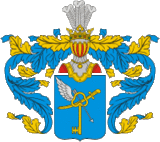Tolstoy (family)
| House of Tolstoy Род Толсты́х |
|
|---|---|
| Noble family | |
 |
|
| Country | Russia |
| Titles | |
| Style(s) | "His/Her Excellency" |
| Founded | 11th century |
| Founder | Andrey Kharitonovich Tolstoy |
| Current head | Nikolai Tolstoy |
| Ethnicity | Russian (Lithuanian ancestry) |
Tolstoy, or Tolstoi (Russian: Толсто́й), is a prominent family of Russian nobility, descending from Andrey Kharitonovich Tolstoy ("the Fat"), who served under Vasily II of Moscow. The "wild Tolstoys", as they were known in the high society of Imperial Russia, have left a lasting legacy in Russian politics, military history, literature, and fine arts.
Andrey Kharitonovich Tolstoy was in turn a great-grandson of a Lithuanian nobleman Indris who was "a man of distinguished ancestry" who came from "the Germans, the Caesar's lands" (the Holy Roman Empire) to Chernigov (now Chernihiv in Ukraine), accompanied by his sons Litvinos and Zimonten and a force of 3000 men. This family legend is unverifiable.
The family first reached prominence in the late 17th century, on account of its connections with the Miloslavsky clan to which Tsar Alexis' first wife belonged. It was Okolnichi Peter Andreevich Tolstoy who decided the family fortune by casting his lot with the party of Peter the Great. He gradually gained in Peter's confidence serving first as the Russian ambassador to Constantinople, then as the head of the secret police. Although detested by contemporaries, Tolstoy was made a count for his part in securing the throne for Catherine I. He later clashed with the mighty Prince Menshikov, who stripped him of his titles and exiled him to the Solovki. The titles and estates were restored to his grandchildren 30 years later.
The most famous of 19th-century Tolstoy politicians was Count Dmitri Andreevich (1823–89), successively the Minister of Education, Minister of Interior and President of the Academy of Science. During his term in office, he put into effect a vigorous Russification program in Poland and Ukraine, for which he is chiefly remembered.
...
Wikipedia
